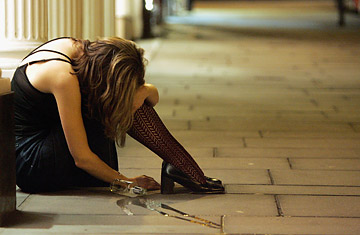
A woman drinker slumps on the pavement in Bristol, England.
What are the key components of Britishness? The bulldog spirit? A stiff upper lip? Or a penchant for Sex on the Beach? With Britain locked in an identity crisis (the English feel English, the Welsh, Welsh and some Scots are so eager to assert their Scottishness that they want to disunite the United Kingdom), these questions are troubling Prime Minister Gordon Brown. He's made the promotion of Britishness a core theme of his leadership and is even writing a book on the subject. Quintessential British qualities, he has said, include: "Our belief in tolerance and liberty ... Our commitment to fairness, fair play and civic duty."
Oddly, Brown overlooked another fundament of Britishness: alcohol-fueled misbehavior. Booze culture unites Britons from Land's End in southwestern England to John O'Groats at the northeastern tip of Scotland, and it's also one of the U.K.'s best-known exports. In sun spots such as Ibiza, Mallorca, the Canary Islands, Spain and Greece, English, Welsh and Scottish holidaymakers raucously intermingle, indistinguishable from each other in their bright leisure wear and brighter sunburns, downing alcoholic concoctions such as Sex on the Beach, sometimes as a prelude to the act itself.
Britons have long suffered from a loutish image abroad. The violent antics of British football supporters, a widespread contempt for foreign cuisines and cultures — none of these foibles have burnished Britain's international reputation. That may seem unfair to the many impeccably behaved Brits who travel without incident every year. But a newly published report into British behavior abroad suggests that more Britons than ever are flying the flag of obnoxiousness in foreign climes. The report reveals a steep increase in arrests of Brits overseas: 33% in Spain and 42% in France over the previous year. "Many arrests are due to behavior caused by excessive drinking," the report states. "We are concerned that drink does play a part in a number of these situations," Meg Munn, a minister in the Foreign and Commonwealth Office, which published the report, told the BBC.
Unpublished research based on a survey of 3003 British, German and Spanish tourists to Ibiza and Mallorca in 2007 shows that rowdiness isn't the sole preserve of Britons. British respondents were marginally less likely to indulge in casual sex than their continental counterparts. Still, almost a third of them did; they had a greater appetite for drugs and were also the undisputed champions of drinking and fighting, with 60% of the Brits returning from Mallorca reporting that they'd been drunk on at least five days of their one-week holiday, compared to 41% of Germans and only 6% of Spanish. More than 7% of Britons, meanwhile, had been involved in a fracas, compared with 3.6% of Germans and just 2.3% of Spanish. Mark Bellis, Professor of Public Health at Liverpool John Moores University which conducted the research with the European Institute of Studies on Prevention, says that "people from all the countries we've looked at have increased levels of alcohol use when they're traveling abroad — they're treating every night like a Friday or Saturday night. The reality, unfortunately, is that the levels of drunkenness among Britons are higher, and that's led to some of the alcohol-related problems we're familiar with."
The full research will be published this autumn in two journals, the European Journal of Public Health and European Addiction Research, and will doubtless be pored over by politicians and officials keen to find a cure for the British malaise. Change won't be easy, though. Pubs and clubs, boozing and late-night curries: these are core elements of British culture. Freed from bad habits, the nation would certainly be healthier, possibly happier. But would it still be Britain?
